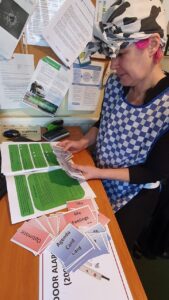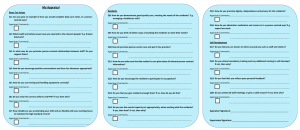My Home Life England programme helps staff supervisions become super visions!
The staff supervision process at Boars Tye Residential Home in Silver End has been transformed by Care Manager Ryan Wicks, who used learnings from his time on the My Home Life Leadership and Development Programme.
Supervision sessions are designed to support and upskill members of staff. However, Ryan realised that the supervision sessions at his home were not fulfilling their primary goal of helping people push themselves to progress further. Instead there was a feeling that supervisions were more of a tick box exercise and supervisees often thought they had nothing to say (when in reality they did!). This meant conversation didn’t flow, supervisions rarely lasted more than ten minutes, and no progression goals were set.
Ryan was determined to change this and realised that learnings from My Home Life could help.
“A supervision should be seen as precious time to improve yourself as a person. I was determined to find a way how I could make a supervision last more than half an hour, making it more meaningful for the supervisor and the supervisee”, said Ryan.
“I first began by changing the word supervision. I felt that the word supervision was more negative than positive, as the English dictionary defines it as: “the action of supervising someone or something”. I realised that the word supervision had the word vision embedded in it. When looking up what vision meant, I saw it said: “the ability to think about or plan the future with imagination or wisdom”. I felt this was more appropriate and positive, because a care worker can think and plan their future within the care sector. This makes it more personal to them, and then it becomes “My Vision”.
Ryan then used his experiences on the My Home Life programme to transform what these new My Vision sessions would look like:
 “When starting My Home Life back in March 2019, we were given touchpoint cards to use as a stimulant to start a conversation in meetings and to get people to express their views and emotions on certain topics. These touchpoint cards have a variety of topics regarding the care sector, including End of Life Care, Visitors, Outside Professionals, and many more.
“When starting My Home Life back in March 2019, we were given touchpoint cards to use as a stimulant to start a conversation in meetings and to get people to express their views and emotions on certain topics. These touchpoint cards have a variety of topics regarding the care sector, including End of Life Care, Visitors, Outside Professionals, and many more.
“These cards help the storyteller to share their experience in a structured way. They can articulate what did and didn’t work well for them. These learnings can be used to identify small improvements that can have a huge impact on how we are with each other. Using this definition, I realised that in a supervision the storyteller is the supervisee as they tell a story of how they feel. I realised that the My Home Life touchpoint cards were a great tool to use in staff supervisions to stimulate conversations.”
Although Ryan was initially reluctant to use the cards as he was worried about the outcome, the cards worked far better than he imagined!
“After the initial question of “What would you like to talk about in this supervision? Do you have any issues?” with the same reply “I have nothing to say really”, I changed the rules. I asked the person in question to pick at least five topics they wished to talk about and to choose an emotion to go with each topic card. I noticed that when this person was picking their topics, they weren’t sure about the topic communication – this topic was not used. After talking about two of the topics they had chosen, the person then went on to talk about issues they had in regards to communication.
After they expressed their feelings, I then said to them “I thought you had nothing to say?” – to their amazement they realised that they had a lot to say but weren’t given the push to say it out loud before! I explained that communication is key to help solve issues and this is why supervisions are important – they express the positives to give praise, but also the negatives so as to set goals to overcome them. This helps a person progress further in their career within the care sector.”
Ryan then encouraged his supervisees to set their own goals – taking ownership and choosing your own targets helps you to be more engaged. All goals are SMART (specific, measurable, achievable, realistic, time-bound), as these are much more likely to be achievable and give you something to work towards within a certain time frame.
In complete contrast, staff now can’t wait for their supervisions!
Ryan has now created his own cards as a simple tool to start meaningful conversation, with new topics and emotions to suit Boars Tye, as well as a new version of supervision paperwork entitled My Vision. This allows important topics and feelings to be documented. At the end of the supervision year, staff will be able to look back on their accomplishments rather than their failures and critically reflect on themselves. Supervisions will take a change of direction, making them meaningful.
“Since starting My Home Life, I have been empowered to progress in my leadership skills, as one day I wish to become a registered manager of a residential care home. I think every manager should go on the My Home Life course, you learn so much stuff! From learning through experience, I decided to create my own supervision process to help supervisees have a clear agenda so that they can progress in what they want to do. I want them to feel that they can be open about their progression within the care sector, by being both positive and negative, and by setting SMART goals to help achieve their vision. Next up we’re looking to do something similar and update our Values as a home”.
The first few pages from Ryan’s “My Vision” document are below. We are very grateful that Ryan shared how his experiences on the My Home Life programme, supported by MHL facilitator Michelle, enabled him to make improvements in best practice in his care home, through modifying the supervision process and improving staff engagement.

